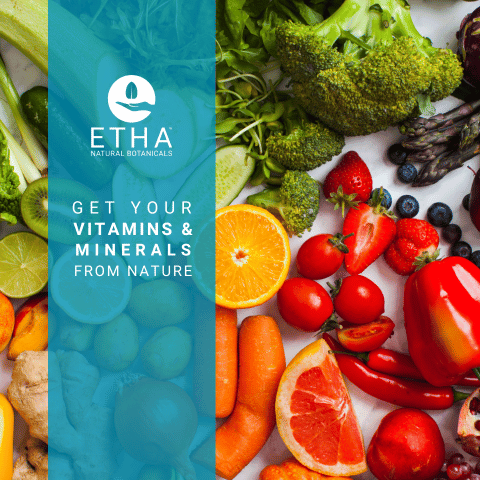Get your Vitamins and Minerals from Nature

Importance of Vitamins and Minerals
Vitamins and minerals are as essential for life as air and water. They may keep your body healthy and functional and they protect you from a variety of diseases. Although, vitamins and minerals get used together often, they are actually quite different. Vitamins are organic substances produced by plants or animals. They often are called “essential” because they are not synthesized in the body (except for vitamin D) and therefore must come from food. Minerals are inorganic elements that originate from rocks, soil, or water. However, you can absorb them indirectly from the environment or an animal that has eaten a particular plant.
The best approach to ensure you get a variety of vitamins and minerals, and in the proper amounts, is to adopt a broad healthy diet. This involves an emphasis on fruits and vegetables, whole grains, beans and legumes, proteins, and dairy products.

Vitamins from Food
Approximately half of all Americans take a daily dietary supplement, like a multivitamin. While supplements can have tremendous benefits, a healthy diet is a good approach to obtaining your vitamins and minerals. Studies of people whose diets are rich in fruits, vegetables, nuts, whole grains, and fish can demonstrate that these individuals successfully consume higher levels of vitamins directly from these foods. Moreover, they also may lower their risk of many diseases, such as heart disease, stroke, diabetes, and cancers.
The best approach to ensure you get a variety of vitamins, and in the proper amounts, is to adopt a broad healthy diet with supplementing particular vitamins you cannot easily obtain through diet. This involves an emphasis on fruits and vegetables, whole grains, beans and legumes, protein, and dairy products. The good news is that many common foods contain multiple vitamin sources, so it is easy to meet your daily needs from everyday meals.
Vitamins are divided into two categories: water soluble (body expels what it does not absorb) and fat soluble (leftover amounts are stored in the liver and fat tissues as reserves). The water-soluble vitamins are the eight B vitamins (B-1, B-2, B-3, B-5, B-6, B-7, B-9, and B-12) and vitamin C. The fat-soluble vitamins are A, D, E, and K. If you fill your diet with a balance of meats, poultry, whole grains, regular and/or soymilk, cheese and even watermelon, you will be sure to get a good dose of all your B vitamins.
Likewise, make sure to add a variety of eggs, shrimp, fish, sweet potatoes, and cabbage. As such, you will feed your body its much needed A, D, E, and K vitamins as well.

Minerals from Nature

Vitamins and Minerals and Kratom
Kratom users predominately take kratom for its pain and energy support. However, what we may not realize is that kratom is simultaneously a very healthy food. Kratom is a superfood that likewise offers an abundance of vitamins, minerals, and even fiber.
Coincidentally, a scientific study on nutritional value of plant leaves found that edible leaves generally contain lots of vitamins and minerals. Specifically, leaves contain significant amounts of Vitamin A, B1, B2, B5, B6, Vitamin C, E, and K1. Likewise, edible leaves contain significant amounts of Calcium, Iron, Magnesium, Phosphorous, Potassium, Sodium, and Zinc.
All types of trees absorb minerals from the ground. Therefore, although there are no specific studies on the exact vitamin and mineral content of kratom leaves, it is not difficult to see how all of the vitamins and minerals mentioned above are in kratom leaves as well. In fact, it is no wonder that traditionally the people of Indonesia (birthplace of kratom) would chew on kratom leaves and brew the leaves into a benefit-rich tea. All in all, kratom really is a superfood. So, add kratom as part of your well-rounded rich diet and get all your vitamins and minerals from nature.
















Leave a comment